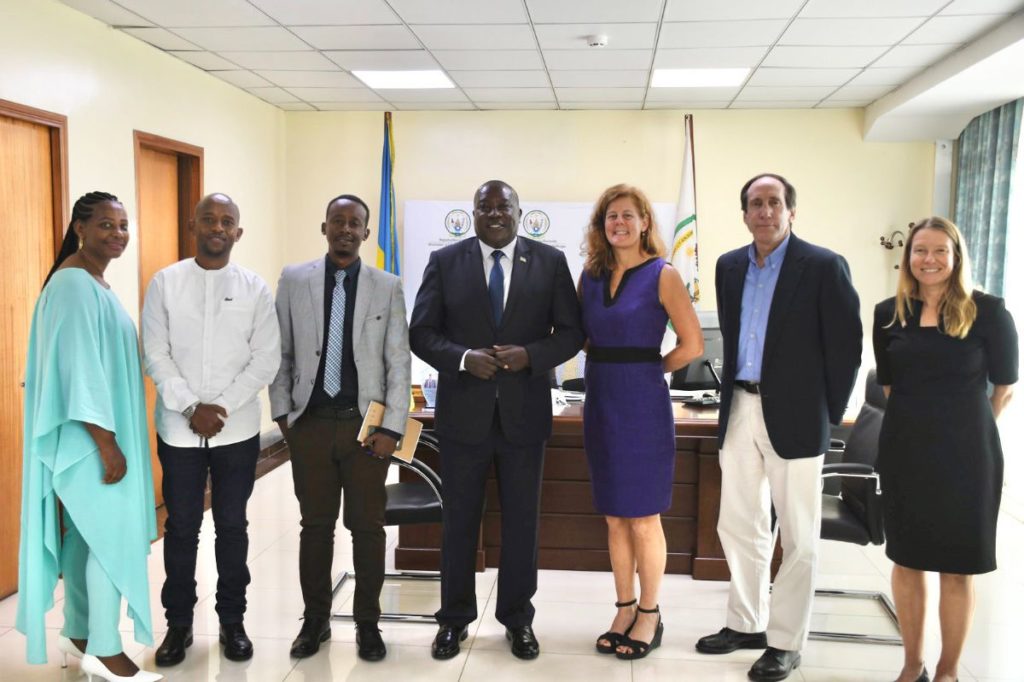
Isoko y’Ubuzima’s successful implementation depends on a sound strategic collaboration with stakeholders to ensure synergistic working relationships and effective management of resources.
Isoko y’Ubuzima’s management team used a comprehensive approach to engage WASH stakeholders in its first months of operation, including governmental ministries, multi-lateral and bi-lateral WASH partners, the private sector; as well as nonprofit organizations – to develop a shared vision about how to strengthen the WASH sector, seek complementary and mutually reinforcing action plans, and avoid geographic and programmatic duplication of efforts and precious resources.
At the Ministry of Local Government (MINALOC), Isoko y’Ubuzima first met with Mr. Samuel Dusengiyumva, Permanent Secretary to introduce the project, followed by a meeting in December 2021 with Honorable Minister Jean Marie Vianney Gatabazi, who convened an introductory meeting with the Isoko y’Ubuzima management and USAID. The Minister underlined that the newly elected local leaders would be willing to collaborate with the project for successful implementation and promised that MINALOC would engage districts and pave the way to a virtual meeting with all the Mayors.
True to his word, the meeting with the mayors of the 10 districts was convened on December 21st, setting the stage for Isoko y’Ubuzima’s in-person tour of all ten districts for introductory meetings in January 2022. Discussions to harmonize Isoko y’Ubuzima’s plans with district planning and budget cycles are now underway.
Isoko y’Ubuzima also engaged Permanent Secretary Patricie Uwase, and Director General in charge of Water and Sanitation Marcelline Kayitesi at the Ministry of Infrastructure (MININFRA). This meeting introduced the project objectives and the supportive role that the project will play in helping the government reach its goal of universal access to drinking water and basic sanitation, and the Sustainable Development Goal 6: To ensure availability and sustainable management of water and sanitation for all. Additionally, through discussions with MININFRA’s Water and Sanitation Sector-Wide Approach (WATSAN SWap) Secretariat, Isoko y’Ubuzima encouraged the reactivation of the Thematic Working Groups and added team members into those strategic discussions.
Isoko y’Ubuzima also met with Ms. Gisele Umuhumuza, Ag. Chief Executive Officer of Water and Sanitation Corporation (WASAC), and Eng. Jacques Nzitonda, Director of Water and Sanitation of the Rwanda Utilities Regulatory Authority (RURA), to introduce the project and identify areas for collaboration.
WASAC expressed its full support to the project in developing solutions to key challenges in the sector, such as the high level of non-revenue water and the need to strengthen the public-private partnerships in managing drinking water services in rural districts.
RURA was enthusiastic about Isoko y’Ubuzima’s planned assistance in the joint development of an improved online information system that will connect service providers, clients, the districts, RURA, and WASAC to improve customer management, revenue collection, and reporting.
Isoko y’Ubuzima also engaged with private sector actors that play essential roles in the national
WASH system, including Private Operators (POs) who manage rural drinking water schemes, along with their umbrella organization Forum des Exploitants Privés des Systèmes d’Eau et Assainissement au Rwanda (FEPEAR), the Association of Sludge Emptiers in Rwanda (ASSERWA), and the Association of Microfinance Institutions in Rwanda (AMIR).
Isoko y’Ubuzima held participatory meetings with each of these private sector actors to introduce the project as well as to discuss their strengths and challenges, and how the project can support them to be more successful while offering equitable and responsive service to their clients.
With AMIR, preliminary discussions focused on collaboration to support vulnerable families with access to sanitation and hygiene loan products through its broad network of microfinance institutions.
Isoko y’Ubuzima met on separate occasions with multi-lateral donors focused on Rwanda’s WASH sector, including the African Development Bank (AfDB) and UNICEF, to align priorities and discuss complementary funding for the development of the WASH Sector Master Plan, drinking water infrastructure, and development of the National Sustainable WASH Sector Financing Strategy. Similarly, Isoko y’Ubuzima met with the Japan International Cooperation Agency (JICA), which together with USAID are the most important bi-lateral development partners for the WASH sector in Rwanda. Isoko y’Ubuzima and JICA exchanged detailed work plans and discussed geographic and programmatic complementarity and support with both tools and technical assistance.
In the area of improved sanitation and hygiene, Isoko y’Ubuzima met with the Ministry of Health (MINSANTE) to discuss plans for its sustainable market-based Sanitation and Hygiene Demand Creation and Social Behavior Change Strategy. This consultation aimed to encourage ownership by the Ministry of Health technical team through an exchange of ideas about the proposed strategy. This involvement set a precedent for how the technical team will be involved in the implementation of the strategy at the field level. The MINSANTE team appreciated Isoko y’Ubuzima’s initiative to involve them at the design stage of the strategy and henceforth pledged their support.
Isoko y’Ubuzima also met with the Gender Monitoring Office (GMO) under the Ministry of Gender and Family Planning. GMO is instrumental to acquire information and develop tools to address common issues related to gender, equity, and social inclusion (GESI). The team met Allen Cyizanye, Executive Secretary and Gender Advisor to discuss the alignment of Isoko y’Ubuzima activities with its goals and the collaboration that will contribute to the optimal implementation of project activities.
In summary, Isoko y’Ubuzima management worked methodically and thoughtfully to present this new project in a manner that demonstrated respect for the ongoing efforts of key stakeholders in the WASH sector, seeking to develop the trust of fellow collaborators in the positive, philosophical approach to finding inter-institutional complementarity and synergy – paving the way for mutually supportive interventions to strengthen the WASH sector. In doing so, Isoko y’Ubuzima will make a valuable contribution to Rwanda’s efforts to provide universal access to safe drinking water and improved sanitation and hygiene for healthy families.

